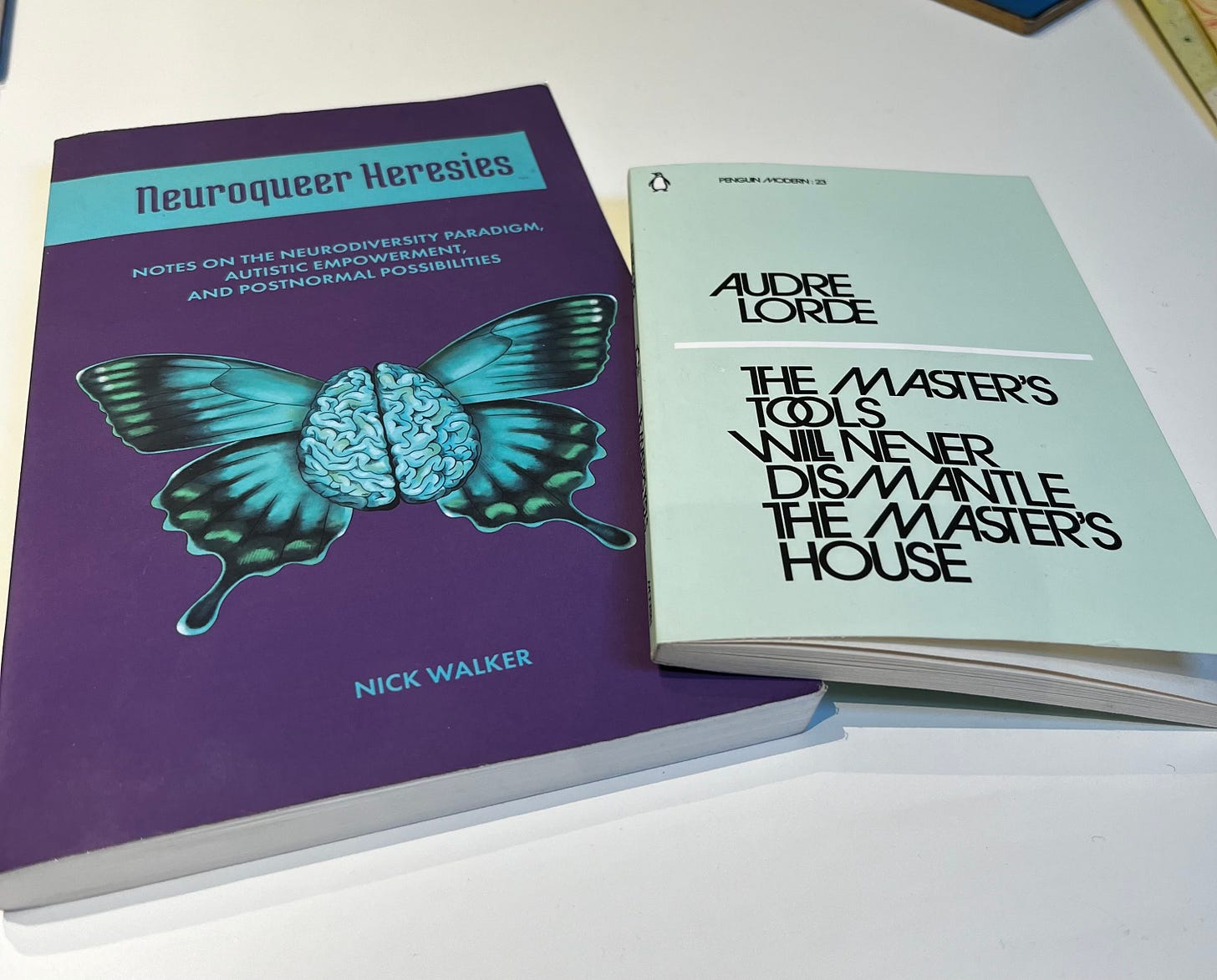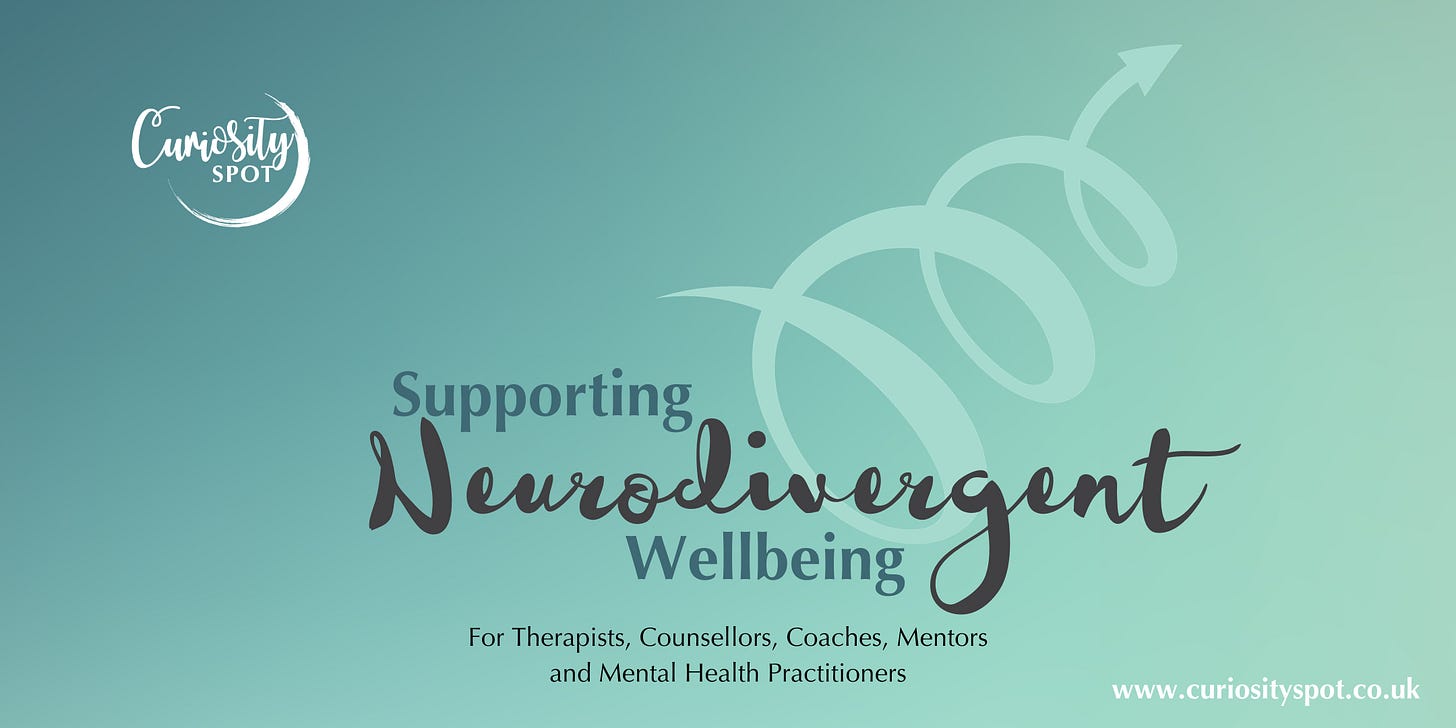Knowledge: The power of Language
Knowing, Understanding, Accepting
Language is important but not always available and even if it is, it may not be sufficient. A long time ago I started coming upon the idea that language itself was limiting while diving into critical theory for my undergrad in Cultural Studies. (I’ll spare you the info dump on my favourite theorists).
I soon recognised that I had come across these ideas when reading 1984 and Orwell described the concept of Newspeak - if you can’t communicate an idea then it is hard for the idea to survive in a wider context than your own brain. Language can be a tool of oppression.
This idea has always stayed with me, whenever I’ve been studying it has come out in some form of other. My dissertation for my counselling masters was on the use of creative therapy in expressing things that exist between, beyond and before language. I’ve studied a lot (can learning be a focused interest?) and I sometimes think I’ve been writing the same essay about this since I was 18.
It’s always come back to how do we communicate the things that can’t be easily said, or that we are not supposed to say. Whether I was talking about ideas, books, films, communities or therapies, I’ve been trying to answer the same questions, about how we get outside the systems and structures that oppress us to express our true lived experience and change it.
For the master’s tools will never dismantle the master’s house. They may allow us temporarily to beat him at his own game, but they will never enable us to to bring about genuine change.
Audre Lorde The Master’s Tool will Never Dismantle the Master’s House
Audre Lorde’s essay1, explores these themes in the context of race and representation within feminist academic circles and Nick Walkers essay Throw Away the Masters Tools: Liberating Ourselves from the Pathology Paradigm2, weaves them into her writing on the neurodiversity paradigm. In it she talks about the importance of embracing the neurodiversity paradigm and its new language as a way of finding space to have a different conversation about neurodivergence, than had been previously possible.
It’s also why the language we use when talking about neurodivergence can seem to be in a constant state of flux as we untangle the language we use from its (often) oppressive roots and seek to find words which break free and allow us to create something new and inclusive. The language we use is evolving as our understanding evolves, as we begin to forge new tools with which to tear down these old houses.
If you reject the fundamental premises of the pathology paradigm, and accept the premises of the neurodiversity paradigm, then it turns out that you don’t have a disorder at all. […] And that your true potential is unknown and is yours to explore. And that maybe you are, in fact, a thing of beauty.
Nick Walker, Neuroqueer Heresies
I feel like I’ve spent most of my life looking for the right words to express myself and my experiences. I love words and language (hyperlexia is part of my spikey profile). It’s one of the reasons that Knowledge is a core thread3 of the work I do with clients, where we figure out the right words and framework to help them make sense of their own experiences.
Because being able to name it, gives us the opportunity to communicate and advocate for our needs. An opportunity to not be alone with what is going on.
But what happens when the words won’t come?
One of the ways that my neurodivergence has always shown up for me (even when I didn’t realise what was happening) is that when I get dysregulated, I can start to struggle with language and particularly verbalising with mouth words.
It’s one of my warning signs that I am in danger of moving towards a shutdown or meltdown, and as someone who loves language it can feel pretty scary when it happens.
The thing that has made the most difference for me, is understanding what is happening through the lens of the neurodiversity paradigm. I now know that this is not a catastrophic event, that my brain hasn’t become broken, it is just one of the ways my spikey profile shows up, as it is for many other neurodivergent folk.
Now I’m able to name it for what it is, the fear has eased a little and I’ve got better at finding other ways to express myself. I use my phone and apps to let my wife know when words are hard, and I try to frame the experience as information - it’s just my body and my brain telling me I’m not ok. It’s a chance to make a different decision about what I’m doing in that moment (although sometimes I have more options than others).
Now know what is happening, I understand what it means for me, and my acceptance allows me to meet it with kindness and compassion, so I can use support to help me move through it with the least amount of distress.
This allows me to communicate with text messages, it means I’ve already had conversations with my wife about what I need when this happens and I am more able to spot the early signs so I can make positive changes earlier in the process.
For me the knowing is always the first step. If I know I can do something about it, but if it’s not in my awareness I’m going to feel out of control and that is going to lead to further dysregulation. For me language is the gateway to knowledge, but I know I have to be constantly vigilant to its hidden treachery, because language can also lead to places I don’t want to go.
Luckily the lens of the neurodiversity paradigm, helps me see through to what truly lies underneath. It is one of the most important tools I have created (with a lot of help from those that have walked this path before me).
I’d love to know which bits of knowledge have helped you to forge new tools with which to dismantle old beliefs and structures.
Upcoming Training
6 Week Course running due to run from 14th May to 25th June on Tuesday evenings 6.30pm-8.30pm (no session 4th June) More details here.
It is based on my model of neurodivergent wellbeing explored in this post.
This course will draw on my lived experience as a late diagnosed autistic (and multiply neurodivergent human), my past professional experience as a disability practitioner and my work as a therapist and supervisor who specialises in working with clients who are looking to explore their neurodivergent identity. In it we will cover the neurodiversity paradigm and how it can inform our practice and support us to be affirming of our neurodivergent clients.
Next running on Tuesday 23rd March 6.30pm-8.30pm Tickets Available here.










This has been a challenge, as my kid talks more, people expect him to have consistent language to spoken language. That’s not how it works. “Use your words.” is not always an option.
For myself, I tend to shut down (not speak) when I am overstimulated. Growing up my family respected that and gave me space. My husband has a very difficult time understanding this and I’ve noticed if I am pressed into verbal language during a shutdown it inverts the experience and suddenly I am melting down.
Once I had this aha moment I’ve talked with him about the necessity and function of the shut down. It’s like a turtle retreating into its shell. It’s an intuitive coping strategy. If that doesn’t work. If someone rams a stick into the turtle shell and pokes my squishy body I become a nuclear bomb. My ability to regulate emotions is completely gone at that time. And I hate that feeling.
Verbal language isn’t always necessary and it isn’t urgent. It can and should wait when the individual is not at capacity to do so.
Thank you, Louise.
I believe language is very powerful. I also recently wrote about an aspect of this topic on my Substack. Before I discovered and was diagnosed as AuDHD, I used to believe that there was something "fundamentally wrong with me." As a young child, I literally recall telling my mother that I wish I could unscrew my head and put someone else's brain in its place instead of mine. I had so much self loathing and self hatred based on being constantly misunderstood and misinterpreted. Not to mention, I was bullied, mocked, teased, and belittled constantly by both my peers and adults. As a school aged child, I had no friends, adults didn't get me, and my parents were absent. I felt totally alone.
A couple of years ago when I finally received my diagnoses (and affirmations of my neurotype). I broke down and cried. Not because I was sad. No! Because finally I felt seen and validated. I began to read everything I could about neurodivergence and my unique neurotypes. I learned about the neurodiversity movement and the importance of language. And, I felt empowered.
I still struggle with aspects of low self-esteem, self-acceptance, and self-confidence. However, receiving my validation and changing the perspective from a language of "pathology" to a language of positive difference has been tremendously vital and important in my healing journey.
I'm now exploring ways to share my story and help others so they don't have to suffer like I did for decades. Thank you, again for sharing your insights.